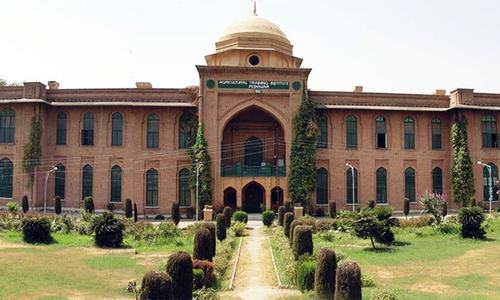PESHAWAR: Hit by a serious financial crisis, the University of Agriculture, Peshawar, has decided that if the federal government doesn’t give it a bailout package, it will cut the salaries and pension of its employees by 60 per cent next month.
“The management is unable to pay full salary and pension to over 2,000 employees, including 500 retired employees, for November if the federal government doesn’t make an immediate intervention,” a senior administrator of the university told Dawn.
Established in 1981, the university is the pioneer institution in agricultural research in the province with 10,000 students enrolled in different faculties at present.
Sources said the decision regarding 60 per cent cut in pension and salary was made in a meeting few days ago.
The official said the university required Rs124 million for the payment of salaries and pension to the serving and retired employees every month in addition to millions of rupees for other recurring expenditure, including power bills and transport.
Looks to federal govt for immediate bailout package
“Cut in grants has already affected research and development activities in the university,” he said, adding that the government has withheld the provision of annual supplementary grant for two years aggravating the university’s financial woes.
Before the financial crisis emerged, the government paid Rs102 million supplementary grant to the university every year for the adjustment of losses.
“The Higher Education Commission and high education department, the administrative bodies at the central and provincial levels, are ignoring our financial crisis despite repeated requests and intimations,” he said.
Like the UAP, the University of Peshawar, Gomal University Dera Ismail Khan and other public sector universities are also on the brink of financial crisis due to up to 20 per cent cut in grant, record depreciation of Pakistani rupee against US dollar, high inflation, shortfall in revenue, and sharp increase in pension bills.
“The University of Peshawar is next in the line of crisis, while the Gomal University is already in hot water,” said an official of the University of Peshawar.
He said the revenue shortfall and whopping pension bill were the major reasons for the financial bankruptcy of the institution.
“The University of Peshawar pays Rs1 billion only to its 1,600 retired employees every year that becomes a major liability,” he said.
The employees of the University of Peshawar total around 2,900.
The official said the irony was that on one hand, the government announced 10-15pc increase in salaries and pension of employees every year but on the other, the federal government imposed more than 20 per cent cut in funds.
“Currently, the University of Peshawar is in deficit and the situation will be no different in other universities in the coming months because of the imbalance in income and expenditure,” he said.
Senior officers and academicians blamed the mushroom growth of universities in the public sector for the prevailing financial crisis of the leading educational institutions in the province.
One official said the University of Peshawar’s major source of revenue was over 100,000 students’ fee of the affiliated degree colleges in the province.
“The university ran a deficit after the creation of new universities as degree colleges were affiliated with the nearest universities,” he said.
The number of public sector universities in the province has reached 30 in the last two decades.
The officials said most universities were established on political grounds instead of the basis of need.
They said the universities had been made ‘employment bureaus’ not for the promotion of research and that hundreds of low-grade employees were recruited on political grounds.
Officials said though the government couldn’t manage resources to pull the agriculture university out of financial crisis, Chief Minister Mahmood Khan announced the conversion of the agricultural research institute in Swat, his hometown, into the agriculture university.
“The slice of cake is the same but it has been divided into 30 pieces that generated financial crisis,” said an official.
Information minister Shaukat Ali Yousafzai was not available for comments on the matter.
Published in Dawn, November 24th, 2019














































Dear visitor, the comments section is undergoing an overhaul and will return soon.